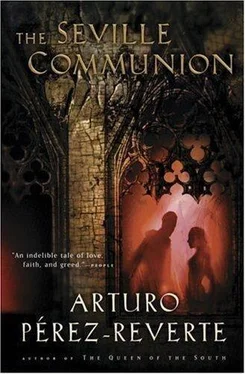Arturo Perez-Reverte - The Seville Communion
Здесь есть возможность читать онлайн «Arturo Perez-Reverte - The Seville Communion» весь текст электронной книги совершенно бесплатно (целиком полную версию без сокращений). В некоторых случаях можно слушать аудио, скачать через торрент в формате fb2 и присутствует краткое содержание. Жанр: Исторический детектив, на английском языке. Описание произведения, (предисловие) а так же отзывы посетителей доступны на портале библиотеки ЛибКат.
- Название:The Seville Communion
- Автор:
- Жанр:
- Год:неизвестен
- ISBN:нет данных
- Рейтинг книги:4 / 5. Голосов: 1
-
Избранное:Добавить в избранное
- Отзывы:
-
Ваша оценка:
- 80
- 1
- 2
- 3
- 4
- 5
The Seville Communion: краткое содержание, описание и аннотация
Предлагаем к чтению аннотацию, описание, краткое содержание или предисловие (зависит от того, что написал сам автор книги «The Seville Communion»). Если вы не нашли необходимую информацию о книге — напишите в комментариях, мы постараемся отыскать её.
The Seville Communion — читать онлайн бесплатно полную книгу (весь текст) целиком
Ниже представлен текст книги, разбитый по страницам. Система сохранения места последней прочитанной страницы, позволяет с удобством читать онлайн бесплатно книгу «The Seville Communion», без необходимости каждый раз заново искать на чём Вы остановились. Поставьте закладку, и сможете в любой момент перейти на страницу, на которой закончили чтение.
Интервал:
Закладка:
"We have a matter suitable for you."
Quart stood listening to his superior, conscious that the dark figure of Iwaszkicwicz was watching him from the window. For ten years, Monsignor Spada had always had a matter suitable for Father Lorenzo Quart. These all came with a place-name and a date – Central America, Latin America, the former Yugoslavia – and were listed in the black leather notebook Quart used as a travel diary. It was a kind of logbook where he had entered details, day by day, of the long journey taken since he had acquired Vatican nationality and joined the operations section of the Institute of External Affairs. "Take a look at this."
The director of the IEA held out a sheet of computer paper. Quart went to take it from him, but at that moment the outline of Cardinal Iwaszkiewicz shifted uneasily at the window. Still holding the paper, Monsignor Spada gave a small smile.
"His Eminence believes this to be a delicate matter," he said looking at Quart, though his words were obviously intended for the cardinal. "And he considers it unwise to involve anyone else."
Quart drew his hand away without taking the document and looked calmly at his superior.
"Naturally," added Spada, his smile almost gone, "His Eminence doesn't know you as I do."
Quart nodded. He asked no questions and showed no impatience; he waited. Spada turned towards Cardinal Iwaszkiewicz.
"I told you he was a good soldier," he said.
There was silence. The cardinal stood against the cloud-filled sky and the rain falling on the Belvedere Gardens. Then he moved away from the window, and the grey light, cast diagonally, revealed a bony jaw, a cassock with a purple collar, and the gold cross on his chest. He extended the hand on which he wore his pastoral ring, took the document from Monsignor Spada, and handed it himself to Lorenzo Quart.
"Read this."
Quart obeyed the order, which was spoken in Italian with a guttural Polish accent. On the sheet of paper were these printed lines:
Holy Father,
My audacity is justified by the gravity of the matter. At times the Holy See seems very far away, beyond the reach of the voices of the humble.
In Spain, in Seville, there is a place where merchants are threatening the house of God and where a small seventeenth-century church, neglected both by the power of the Church and the lay authorities, kills to defend itself I beg you, Your Holiness, as a pastor and priest, to cast your eyes upon the most humble sheep in your flock and demand an explanation from those who have abandoned them to their fate.
I beg for your blessing, in the name of Our Lord Jesus Christ.
"This appeared on the Pope's personal computer," explained Monsignor Spada when Quart had finished reading. "Anonymously."
"Anonymously," echoed Quart. He was in the habit of repeating certain words aloud, like a helmsman or NCO repeating his superior's orders. As if he were giving himself, or others, the chance to think about what had been said. In his world, certain words, certain orders – sometimes no more than an inflection, a nuance, a smile – could turn out to be irreversible.
"The intruder," the archbishop was saying, "cunningly hid his exact location. But our enquiries have confirmed that the message was sent from Seville, from a computer with a modem."
Quart slowly reread the letter. "It mentions a church that…" He broke off, waiting for someone to finish the sentence for him. The part that followed sounded too ridiculous to speak aloud.
"Yes," said Spada, "a church that kills to defend itself."
"Appalling," said Iwaszkiewicz. He didn't specify whether he meant the notion or the church.
The archbishop went on. "We've checked, and it does exist. The church." He glanced quickly at the cardinal and then ran his finger along the edge of the paperknife. "We've also found out about a couple of irregular and unpleasant occurrences."
Quart put the document on the desk. The archbishop looked at it as if the thing was dangerous to touch. Cardinal Iwaszkiewicz picked up the paper, folded it, and slipped it into his pocket. He turned to Quart.
"We want you to go to Seville and find out who sent it."
He was very close. Quart could almost smell his breath. The proximity was unpleasant, but he locked eyes with the cardinal for a few seconds. Then, making an effort not to take a step back, he glanced over the cardinal's shoulder at Spada who smiled briefly, grateful to Quart for indicating his loyalty in such a way.
"When His Eminence says*we'," the archbishop explained, "he is referring not only to himself and me but also, of course, to the will of the Holy Father."
"Which is God's will," added Iwaszkiewicz, almost provocatively. He was still standing very close to Quart, his hard black eyes staring.
"Which is, indeed, God's will," said Monsignor Spada without allowing the slightest hint of irony into his voice. Despite his power, the director of the IEA knew he could only go so far, and his look contained a warning to his subordinate – they were both swimming in dangerous waters.
"I understand," said Quart and, again meeting the cardinal's eye, nodded briefly. Iwaszkicwicz seemed to relax slightly. Behind him Spada inclined his head approvingly.
"I told you that Father Quart…"
The Pole raised his hand – the one that bore his cardinal's ring – to interrupt the archbishop. "Yes, I know." He gave Quart a final glance and then moved back to the window. "A good soldier." His tone was weary, ironic. He looked out at the rain as if the matter no longer concerned him.
Spada put the paperknife on his desk, opened a drawer, and took out a thick blue folder.
"Finding out who sent the message is only part of the job," he said. "What do you gather from reading it?"
"It could have been written by a priest," answered Quart without hesitation. Then he paused before adding: "And he might very well be mad."
"It's possible." Spada opened the folder and leafed through a file full of press cuttings. "But he's a computer expert, and what he says is true. That church does have problems. And causes them too. Two people have died there in the last three months. There's a whiff of scandal about the whole business."
"It's more than that," said the cardinal without turning. Again he was a dark shape against the grey light of the window.
"His Eminence," explained Spada, "believes that the Holy Office should intervene." He paused deliberately. "As in the old days."
"The old days," repeated Quart. He'd never much liked the methods of the Congregation for the Doctrine of the Faith. For an instant he saw the face of Nelson Corona, a priest from the Brazilian favelas, a proponent of liberation theology. Quart had supplied the wood for his coffin.
"The thing is," Spada was saying, "the Holy Father wants the investigation to be appropriate to the situation. He believes it would be excessive to involve the Holy Office. Like swatting a fly with a cannon." He paused and turned to Iwaszkiewicz. "Or a flame-thrower."
"We don't burn people at the stake any more," the cardinal said, still looking out of the window. He seemed to regret it.
"In any case," the archbishop went on, "it's been decided, for the time being" – he stressed these last words – "that the Institute of External Affairs is to carry out the investigation. You, in other words. And only if more serious evidence emerges is the matter to be referred to the official arm of the Inquisition."
"I would remind you, brother in Christ, that the Inquisition hasn't existed for thirty years," the cardinal said.
"You're right. Forgive me, Your Eminence. I meant to say the official arm of the Congregation for the Doctrine of the Faith."
Monsignor Spada fell silent a moment. His look at Quart seemed to say, Beware of this Pole. When he spoke again, he was reserved and formal. "You, Father Quart, are to spend a few days in Seville. You are to do everything possible to find out who sent the message. Maintain contact with the local church authority. And above all, conduct the investigation in a prudent, discreet manner." He placed another file on top of the first one. "This contains all the information we have. Do you have any questions?"
Читать дальшеИнтервал:
Закладка:
Похожие книги на «The Seville Communion»
Представляем Вашему вниманию похожие книги на «The Seville Communion» списком для выбора. Мы отобрали схожую по названию и смыслу литературу в надежде предоставить читателям больше вариантов отыскать новые, интересные, ещё непрочитанные произведения.
Обсуждение, отзывы о книге «The Seville Communion» и просто собственные мнения читателей. Оставьте ваши комментарии, напишите, что Вы думаете о произведении, его смысле или главных героях. Укажите что конкретно понравилось, а что нет, и почему Вы так считаете.












